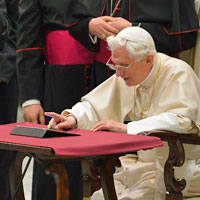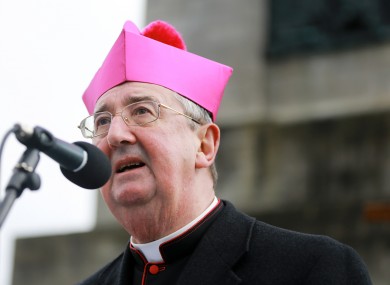Mockery outweighs piety after Pope’s Twitter debut. It’s headlines like that which have caused some people to shake their heads and lament Benedict’s foray into Twitter.
Here’s a sample of the responses I have head from friends and acquaintances who love the Church and think deeply about her:
-
“This just reinforces that idea that the Pope’s voice is one voice equal among many . . . I think it trivializes his teaching authority.”
- “Twitter is a waste of time and reduces the Holy Father in the popular mindset to just another celeb or ragazzo seeking affirmation by having a huge following.”
- “How can faith in Jesus be lived in a world without hope? What the? Are we living in a world without hope? Maybe. Probably. Who cares? I should care, but I don’t care BECAUSE I’M READING IT ON TWITTER. Twitter is a social network filled with mindless twaddle about everything unimportant.”
I can sympathise, but I don’t find the appeal to papal dignity at all compelling. In fact, this line of argument reminds me of a devastating exchange between Guy Crouchback and his saintly father in Evelyn Waugh’s Sword of Honour trilogy.
Guy took his leave and was at Matchet when Italy surrendered. News of the king’s flight came on the day the brigade landed at Salerno. It brought Guy some momentary exhilaration.
‘That looks like the end of the Piedmontese usurpation,’ he said to his father. ‘What a mistake the Lateran Treaty was. It seemed masterly at the time — how long? Fifteen years ago? What are fifteen years in the history of Rome? How much better it would have been if the Popes had sat it out and then emerged saying: “What was all that? Risorsimento? Garibaldi? Cavour? The House of Savoy? Mussolini? Just some hooligans from out of town causing a disturbance. Come to think of it wasn’t there once a poor little boy whom they called King of Rome?” That’s what the Pope ought to be saying today.’
Mr Crouchback regarded his son sadly. ‘My dear boy,’ he said, ‘you’re really talking the most terrible nonsense, you know. That isn’t at all what the Church is like. It isn’t what she’s for.’
They were walking along the cliffs returning at dusk to the Marine Hotel with Mr Crouchback’s retriever, ageing now, not gambolling as he used but loping behind them. Mr Crouchback had aged too, and for the first time showed concern with his own health. They fell silent, Guy disconcerted by his father’s rebuke, Mr Crouchback still, it seemed, pondering the question he had raised; for when at length he spoke it was to say: ‘Of course it’s reasonable for a soldier to rejoice in victory.’
‘I don’t think I’m interested in victory now,’ said Guy.
‘Then you’ve no business to be a soldier.’
‘Oh, I want to stay in the war. I should like to do some fighting. But it doesn’t seem to matter now who wins. When we declared war on Finland . . .’
He left the sentence unfinished, and his father said: ‘That sort of question isn’t for soldiers.’
As they came into sight of the hotel, he added: ‘I suppose I’m getting like a schoolmaster. Forgive me. We mustn’t quarrel. I used often to get angry with poor Ivo; and with Angela. She was rather a tiresome girl the year she came out. But I don’t think I’ve ever been angry with you.’
Guy left next day and reported to the Halberdier barracks. He had little appetite for leave now.
Three days later a letter came from his father:
Marine Hotel
Matchet
20 September 1943My Dear Guy,
I haven’t been happy about our conversation on your last evening. I said too much or too little. Now I must say more.
Of course in the 1870s and 80s every decent Roman disliked the Piedmontese, just as the decent French now hate the Germans. They had been invaded. And, of course, most of the Romans we know kept it up, sulking. But that isn’t the Church. The Mystical Body doesn’t strike attitudes and stand on its dignity. It accepts suffering and injustice. It is ready to forgive at the first hint of compunction.
When you spoke of the Lateran Treaty did you consider how many souls may have been reconciled and have died at peace as the result of it? How many children may have been brought up in the faith who might have lived in ignorance? Quantitative judgements don’t apply. If only one soul was saved that is full compensation for any amount of loss of ‘face’ . . .
Ever your affect. father,
G. Crouchback.






You’re right: it’s not beneath the dignity of the Pope.
It’s beneath the dignity of a man.